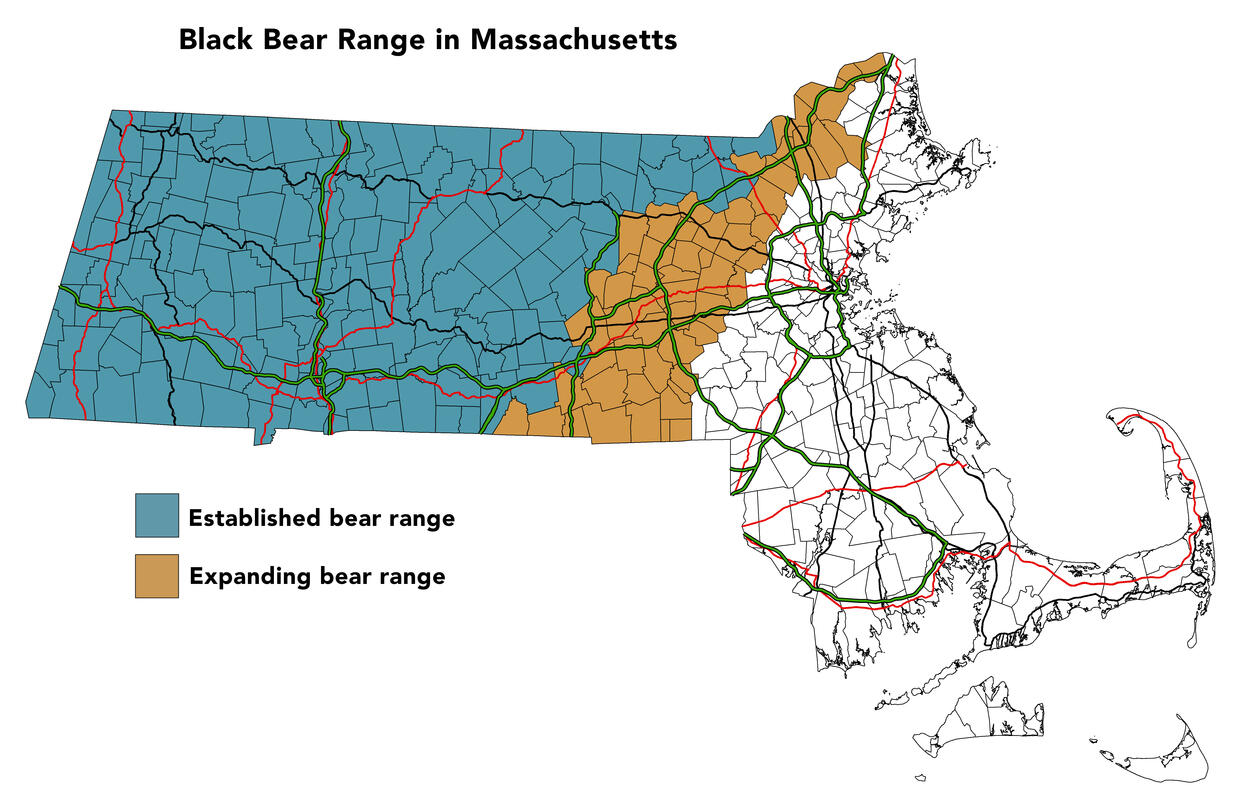Black bears in Massachusetts
Though Massachusetts is the third most densely-populated state in the country, black bears have been increasing in numbers and distribution since the 1970s. The statewide population of bears is estimated to be over 4,500 animals and is growing and expanding eastward. Black bears live and breed in Worcester County, northern Middlesex County, and west to the Berkshires. Bears, mostly young males and some breeding females, are living in other eastern Massachusetts communities along Route 495. Dispersing young bears and wandering males often find themselves east of Route 495.
Description
Black bears are black overall with a brown muzzle and sometimes a white chest patch. Their feet are large and well-padded, with moderate-sized, curved claws. Male black bears generally range in weight from 130 to 600 pounds and females from 100 to 400 pounds.
Life history
Black bears have good eyesight and hearing. Their extraordinary sense of smell is used both to locate food and recognize potential danger. They are excellent climbers and use trees to rest, escape threats, and protect their young. Black bears mate between mid-June and mid-July. Depending on food availability and snow cover, bears will den between mid-November and early December and exit between early March and mid-April. Bears commonly den in brush piles, under fallen trees or jumbles of rocks, or in mountain laurel thickets. A litter of usually two or three cubs is born in the den in mid-to-late January and they remain with the sow (adult female) for about 17 months.
Food, habits, and habitat
Bears are omnivores, meaning they eat both vegetation and meat. In spring, bears feed on lush, green emerging plants and are often seen in wetlands. In summer, they take advantage of ripening berries and can often be found in thick regenerating forest stands where berries are often found. Ripened corn and stands of oak, beech, and hickory trees are favored foods in the fall. Bears also feed on grubs and insects, dead animals, and occasionally young deer. Bears will visit birdfeeders, orchards, and beehives. It is not unusual for bears to use residential areas, and they are often attracted to yards by bird feeders and unsecured trash. Bears have excellent long-term memory and can remember the location of food sources years after the first visit. Black bears are important and valuable mammals in Massachusetts. They are big game mammals for which regulated hunting seasons and a management program have been established.
Tips for residents
Bears that have been habituated (accustomed) and dependent on human-associated foods, such as bird seed, trash, and pet food, are likely to cause damage and become a nuisance. Removal of food sources and other attractants is key to preventing problems with bears.
Remove bird feeders
Bird feeders draw bears and other wildlife into residential areas and near people. There is no safe time of day or year to have bird feeders out. Bears that find bird feeders in backyards will start to look for other food sources, like backyard chickens, goats, and other small livestock. This can cause bears to lose their fear of people, which can lead to the bear being euthanized to ensure human health and safety. You should remove bird feeders at the first sign of bear activity and avoid leaving empty feeders out. Support local songbirds by growing native plants, shrubs, and trees and adding a water feature.
Protect chickens, bees, and small livestock
Standard coops or pens will not keep bears out. Use properly installed and maintained electric fencing to safeguard hives, coops, and pens. Keep open, mowed areas on all sides of hives and coops and do not locate them in abandoned areas or close to brushy, overgrown areas. Learn how to properly install an effective electric fence.
Secure trash and other attractants
Put trash cans out the morning of trash pickup, not the previous evening. Store all garbage in closed containers in a garage, outbuilding, or bear-resistant trash caddy. Using double bags or sprinkling with ammonia will help reduce odors. If you compost, do not throw meat scraps, greasy, oily, or sweet materials in your compost pile. Businesses, apartments, and campgrounds in areas with bear activity should invest in bear-resistant dumpsters with a locking lid. Trash should always be placed inside the dumpster and never left accessible to bears. Always feed pets indoors. Clean greasy barbecues and grills after each use. Do not leave food scraps, grease containers, or spilled grease in your yard.
What to do if you see a bear
- Protect your pets: The presence of a dog could trigger a bear to be aggressive. Keep dogs leashed whenever they’re outside and never let dogs chase or interact with bears. Check your yard before going outside with your dog. If you encounter a bear while with your dog, keep your dog leashed, back away slowly, and leave the area.
- Seeing a bear in your yard: If you see a bear in your yard, wait for the bear to leave, then remove or secure food sources on your property.
- Seeing a bear in nature: Black bears are usually wary of people and normal trail noise will alert the bear of your presence. If you encounter a bear while hiking or camping, talk in a calm voice and slowly back away. Do not approach bears or intrude between a female bear and her cubs. Do not run. Fight back if a black bear makes contact with you.
More tips for preventing conflicts with black bears.
If you are experiencing problems with black bears or have questions, contact your nearest MassWildlife office.
Additional Resources
-
Open PDF file, 5.9 MB, Living with black bears fact sheet (English, PDF 5.9 MB)
-
Open PDF file, 658.11 KB, Coexisting with black bears (English, PDF 658.11 KB)
-
Open PDF file, 92.3 KB, Printable quick tips for avoiding bear conflicts (English, PDF 92.3 KB)
